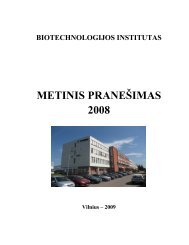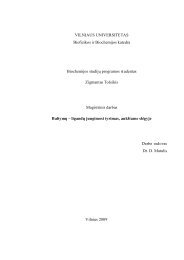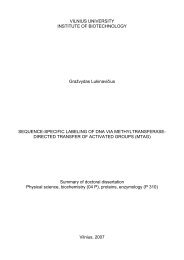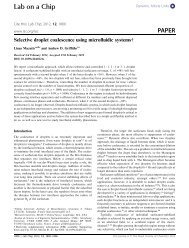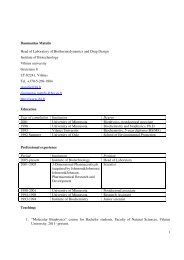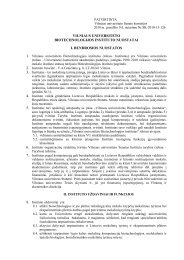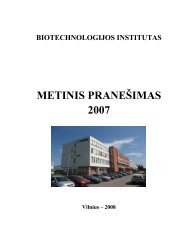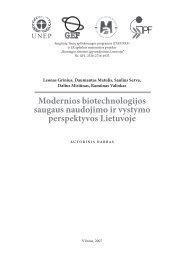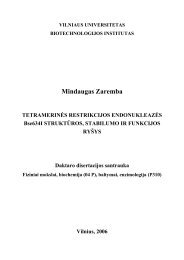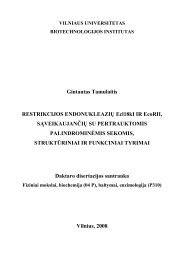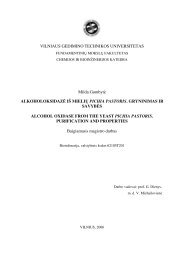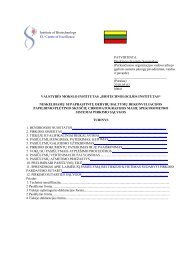Report 2008-2010
Report 2008-2010
Report 2008-2010
You also want an ePaper? Increase the reach of your titles
YUMPU automatically turns print PDFs into web optimized ePapers that Google loves.
Until recently, IS6110-RFLP and spolygotyping were recognized as the<br />
reference methods. Currently, IS6110-RFLP assay are replacing by 24-<br />
locus MIRU-VNTR typing as the gold standard for genotyping of M.<br />
tuberculosis. Therefore, in the frame of the TB PAN-NET project we<br />
have started molecular epidemiology study of drug resistant strains in<br />
Vilnius by using MIRU-VNTR typing as well. The results demonstrated<br />
a good correlation between these both techniques.<br />
Investigation of mutations conferring M. tuberculosis resistance to the<br />
second-line drugs was continued by search for mutations associated<br />
with resistance to ofloxacin and reserve aminoglycosides. Currently,<br />
our collections consist of 126 ofloxacin-resistant isolates and 152<br />
kanamycin-resistant, including 26% amikacin-resistant isolates, from<br />
different patients and characterized in detail by the means of genotyping.<br />
However, only 82% of ofloxacin- resistant isolates carried resistance<br />
conferring mutations in the quinolone resistance-determining<br />
regions (QRDR) of gyrA or gyrB genes and 16% of kanamycin-resistant<br />
strains had mutations in the rrs gene. These results demonstrated<br />
that significant part of resistant cases cannot be explained by the presence<br />
of mutations in the well-recognized hot spot regions of M. tuberculosis<br />
chromosome (Devaux et al., Euro Surveill. <strong>2010</strong>). Search for<br />
novel mutations associated with M. tuberculosis resistance to these<br />
drugs is in progress.<br />
This work was supported by the Lithuanian State Science and Studies<br />
Foundation (grant No. C-01), EC FP7 Health Programme (Project TB<br />
PAN-NET, grant No. 223681), and Agency for Science, Innovation and<br />
Technology (grants No. 31V-169, No. 31V-32).<br />
Dr. P.Stakėnas and junior scientist D.Bakonytė<br />
perform genotyping of M.tuberculosis<br />
Collaboration<br />
Dr. R.Ulrich, Friedrich-Loeffler Institute, Greifswald-Insel Riems, Germany<br />
Dr. V.Gorboulev, Wurzburg University, Wurzburg, Germany<br />
Dr. W.Michalski, Australian Animal Health Laboratory, Australia<br />
Prof. L.Poellinger, Karolinska Institute, Stockholm, Sweden<br />
Dr. J.Makino, Tokyo University, Tokyo, Japan<br />
Prof. E. Pettersen, Oslo University, Oslo, Norway<br />
Prof. P.Ebbesen, Aalborg University, Aalborg, Denmark<br />
Prof.A.C. Cato, Karlsruhe University, Karlsruhe, Germany<br />
Dr. E. Davidavičienė, Dr. E. Pimkina, National Tuberculosis and Infectious Diseases University Hospital, Vilnius, Lithuania.<br />
Prof. A. Pavilonis, Kaunas University of Medicine, Lithuania.<br />
Dr. D. M. Cirillo, San Raffaele Scientific Institute, Milan, Italy.<br />
Prof. F. Drobniewsky, Queen Mary and Westfield College, University of London, United Kingdom<br />
Prof. A. Gori, San Gerardo Hospital, Italy<br />
Dr. D. van Soolingen, National Institute for Public Health and the Environment (RIVM), Bilthoven, The Netherlands.<br />
Grants<br />
EU Framework 6th Programme<br />
EU Framework 7th Programme<br />
Lithuanian State Science and Studies Foundation/Lithuanian Science Council<br />
Lithuanian Agency for Science, Innovation and Technology<br />
Contracts<br />
UAB Fermentas, Vilnius, Lithuania<br />
Abcam Ltd, Cambridge, UK<br />
Santa Cruz Biotechnology, USA<br />
35 th anniversary<br />
40



